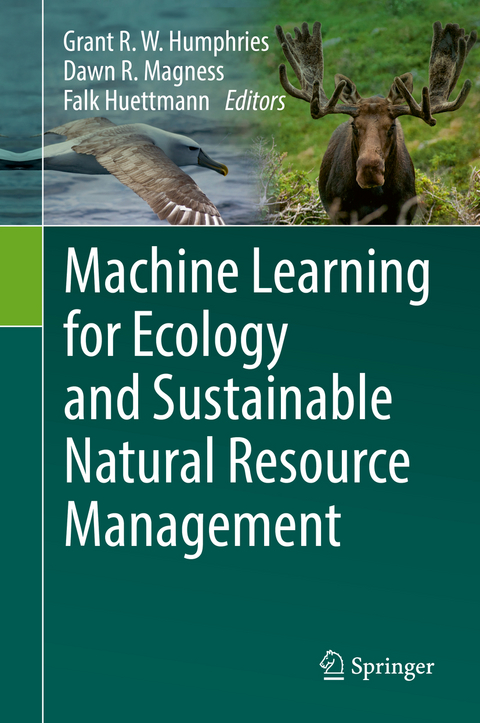
Machine Learning for Ecology and Sustainable Natural Resource Management
Springer International Publishing (Verlag)
978-3-319-96976-3 (ISBN)
Ecologists and natural resource managers are charged with making complex management decisions in the face of a rapidly changing environment resulting from climate change, energy development, urban sprawl, invasive species and globalization. Advances in Geographic Information System (GIS) technology, digitization, online data availability, historic legacy datasets, remote sensors and the ability to collect data on animal movements via satellite and GPS have given rise to large, highly complex datasets. These datasets could be utilized for making critical management decisions, but are often "messy" and difficult to interpret. Basic artificial intelligence algorithms (i.e., machine learning) are powerful tools that are shaping the world and must be taken advantage of in the life sciences. In ecology, machine learning algorithms are critical to helping resource managers synthesize information to better understand complex ecological systems. Machine Learning has a wide variety of powerful applications, with three general uses that are of particular interest to ecologists: (1) data exploration to gain system knowledge and generate new hypotheses, (2) predicting ecological patterns in space and time, and (3) pattern recognition for ecological sampling. Machine learning can be used to make predictive assessments even when relationships between variables are poorly understood. When traditional techniques fail to capture the relationship between variables, effective use of machine learning can unearth and capture previously unattainable insights into an ecosystem's complexity. Currently, many ecologists do not utilize machine learning as a part of the scientific process. This volume highlights how machine learning techniques can complement the traditional methodologies currently applied in this field.
Dr. Grant Humphries is an ecological data scientist having worked on a number of marine and terrestrial projects (mostly seabirds) around the world where machine learning tools were critical to solving complex problems. He has over a decade of experience working with machine learning tools and techniques and loves applying them in novel and interesting ways. He is the founder of Black Bawks Data Science Ltd., a small data science company based in the highlands of Scotland, where he works on building interactive, web-based decision support tools that integrate advanced modeling. He is also a penguin counter, traveling to Antarctica every year to collect data for the Antarctic Site Inventory. His spare time is dedicated to music, cooking and spending time with his two daughters: Dylan and River, and his wife, Alex. Dr. Dawn Magness is a landscape ecologist interested in climate change adaptation, landscape planning, ecological services, and spatial modeling. She earned her M.S. in Fish and Wildlife Science at Texas A & M University and her Ph.D. in the interdisciplinary Resilience and Adaptation Program at the University of Alaska, Fairbanks. Her current projects use multiple methods to assess ecosystem vulnerability to inform strategic adaptation planning. She has conducted research on songbirds, flying squirrels, and American marten. Dr. Falk Huettmann is a 'digital naturalist' linking computing and the internet with natural history research for global conservation and sustainability. He is a professor of Wildlife Ecology in the Biology & Wildlife Department and Institute of Arctic Biology at the University of Alaska Fairbanks (UAF) where he and many international students run the EWHALE lab. In his lab he studies biodiversity, land- and sea-scapes, the atmosphere, global governance, ecological economics, diseases and new approaches to global sustainability on a pixel-scale. Most of his 200 publications and 7 books are centered on Open Access and Open Source science, Geographic Information Systems (GIS), data mining and machine learning.
1: Introduction to Machine Learning A. Data-intensive science B. Data Issues and Availability.- 2: Data-mining in Ecological and Wildlife Research A. Multiple Methods in the Scientific Process B. Data-mining in Ecological and Wildlife Research C. Applications in Ecological Research a. Predicting Patterns in Space and Time b. Data Exploration and Hypothesis Generation c. Pattern Recognition for Sampling D. Bringing It All Together: Leveraging Multiple Methods to Increase Knowledge for Resource Management.- 3: Machine Learning and Resource Management A. Web-based Machine Learning Applications for Wildlife Management B. Linking Machine Learning in Management Applications C. Machine Learning and the Cloud for Natural Resource Applications D. The Global View: Hopes and Disappointments E. The Future of Machine Learning.
"If you are looking for a book that describes how ML has been used or could be used on your own spatial ecology data sets, I recommend this book. I also recommend it for readers looking for a book that provides thoughtful arguments about data analysis, in general, and where it could be moving in the future." (John Carriger, Integrated Environmental Assessment and Management, Vol. 16 (1), 2020)
“If you are looking for a book that describes how ML has been used or could be used on your own spatial ecology data sets, I recommend this book. I also recommend it for readers looking for a book that provides thoughtful arguments about data analysis, in general, and where it could be moving in the future.” (John Carriger, Integrated Environmental Assessment and Management, Vol. 16 (1), 2020)
| Erscheinungsdatum | 15.11.2018 |
|---|---|
| Zusatzinfo | XXIV, 441 p. 126 illus., 80 illus. in color. |
| Verlagsort | Cham |
| Sprache | englisch |
| Maße | 155 x 235 mm |
| Gewicht | 859 g |
| Themenwelt | Naturwissenschaften ► Biologie ► Ökologie / Naturschutz |
| Schlagworte | Artificial Intelligence • Data Mining • machine learning • natural resource management • Quantitative ecology • Sampling • Statistics • wildlife biology |
| ISBN-10 | 3-319-96976-5 / 3319969765 |
| ISBN-13 | 978-3-319-96976-3 / 9783319969763 |
| Zustand | Neuware |
| Informationen gemäß Produktsicherheitsverordnung (GPSR) | |
| Haben Sie eine Frage zum Produkt? |
aus dem Bereich


